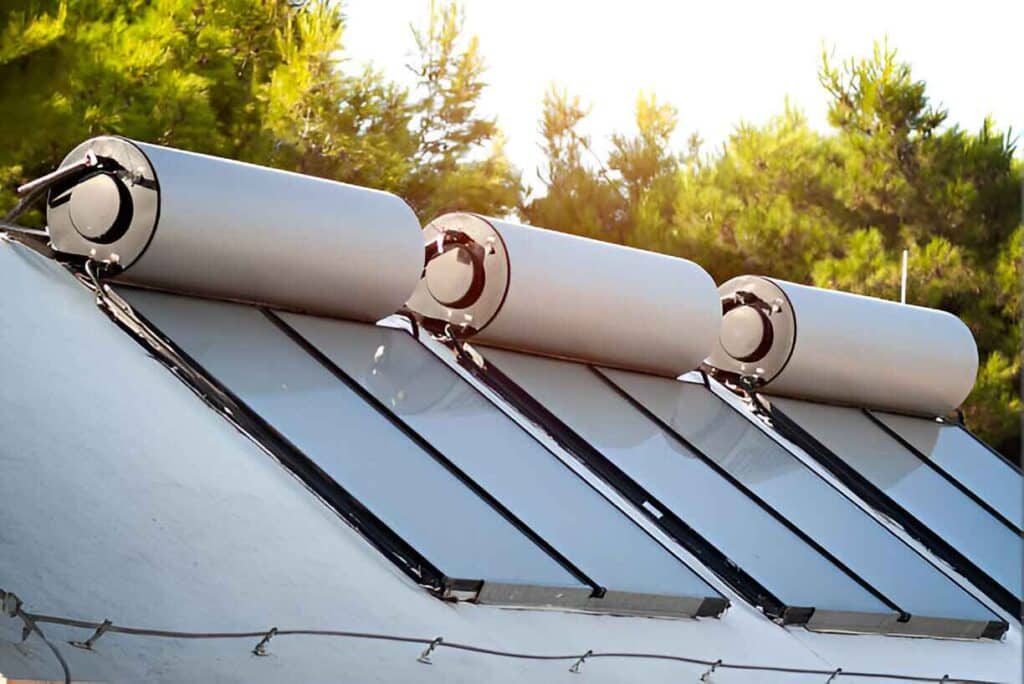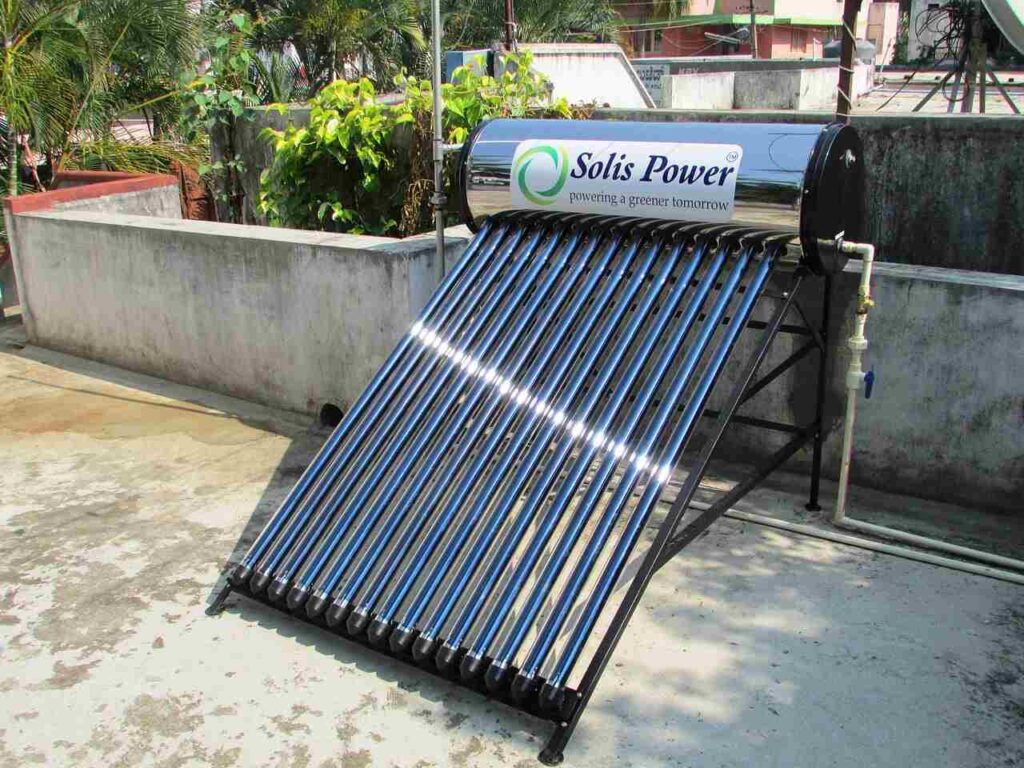Solar Water Heaters in Ghana: Revolutionizing Energy Efficiency
Solar water heaters in Ghana offer an eco-friendly and cost-effective solution for hot water needs. They harness the sun’s energy, reducing electricity bills.
Ghana’s abundant sunshine makes solar water heaters an ideal choice for households and businesses. These systems use solar panels to absorb sunlight, converting it into heat. This heat warms the water stored in insulated tanks, ensuring a consistent hot water supply.
Solar water heater reduce dependency on electricity, lowering energy costs and promoting sustainability. Installation is straightforward, and maintenance is minimal, making it a convenient option. By adopting solar water heater, Ghanaians can contribute to environmental conservation while enjoying reliable hot water. This technology supports Ghana’s green energy goals and offers long-term financial benefits.

Introduction To Solar Water Heaters
Solar water heaters are becoming popular in Ghana. They provide a sustainable way to heat water. This blog will guide you through the basics of solar water heater.
What Are Solar Water Heaters?
Solar water heater use the sun’s energy to heat water. They are eco-friendly and save money on electricity bills.
There are two main components:
- Solar Collectors: These absorb sunlight and convert it into heat.
- Storage Tanks: These store the heated water for later use.
Some systems also include a backup heater for cloudy days. Solar water heaters can be installed on rooftops or open spaces with direct sunlight.
Importance In Modern Energy Solutions
Solar water heaters offer many benefits in modern energy solutions. They reduce dependence on fossil fuels and cut down electricity costs. This makes them an affordable option for many households.
Here are some key benefits:
- Environmental Impact: They reduce carbon emissions and combat climate change.
- Cost Savings: Lower electricity bills and maintenance costs over time.
- Energy Independence: Less reliance on the national power grid.
In Ghana, solar water heater can address energy shortages. They are a practical solution for remote areas without reliable electricity.
Energy Landscape In Ghana
The energy landscape in Ghana is diverse. The country relies on various energy sources. Ghana has the potential for renewable energy. Solar water heater can play a crucial role. They can help reduce energy costs and save the environment.
Current Energy Sources
Ghana uses different types of energy sources. Below are the main ones:
- Hydropower: This is the primary source of energy. It supplies about 43% of the electricity.
- Thermal Power: It contributes around 57% of the electricity. This includes gas and oil-based plants.
- Solar Energy: Solar power is still emerging. It has the potential to grow.
Challenges In Energy Supply
Ghana faces several challenges in energy supply. These include:
- High Demand: The demand for electricity is rising. This puts pressure on existing sources.
- Power Outages: Frequent blackouts affect daily life. They also impact businesses.
- High Costs: Energy production is expensive. This makes electricity bills high.
Solar water heater can address these challenges. They are affordable and sustainable. They can reduce the reliance on traditional sources. This makes them a smart choice for Ghana.
Benefits Of Solar Water Heaters
Solar water heater offer numerous benefits for households in Ghana. They are efficient, eco-friendly, and cost-effective. These heaters use the sun’s energy to heat water, making them a smart investment. Let’s explore the key benefits of solar water heaters.
Cost Savings
Solar water heater help you save money on electricity bills. The initial investment may seem high, but the long-term savings are significant. Once installed, these systems require minimal maintenance.
| Traditional Heaters | Solar Water Heaters |
|---|---|
| High electricity costs | Low operating costs |
| Monthly bills | Free solar energy |
| Frequent repairs | Low maintenance |
Environmental Impact
Solar water heater reduce carbon footprint. They use clean, renewable energy. This helps in fighting climate change. Less fossil fuel use means less pollution. By choosing solar, you help protect the environment.
- Reduces greenhouse gases
- Promotes renewable energy
- Decreases air pollution
Solar water heaters are a sustainable choice. They support a greener planet. Make the switch today and enjoy these benefits.
Adoption In Ghana
The adoption of solar water heaters in Ghana is on the rise. Many households and businesses are switching to this eco-friendly option. This shift is driven by the need for sustainable energy solutions. Solar water heater offer both environmental and economic benefits. Let’s explore the key factors driving adoption in Ghana.
Market Trends
The market for solar water heaters in Ghana is growing. New players are entering the market, offering competitive prices. Local manufacturers are also emerging, reducing costs further. The demand for solar water heater is expected to rise. This growth is fueled by both economic and environmental factors.
| Factor | Impact |
| Competitive Prices | Higher demand |
| Local Manufacturing | Cost reduction |
- Tax breaks for solar water heater installations
- Awareness campaigns by the government
- Emerging local manufacturers
In summary, the adoption of solar water heaters in Ghana is growing. Government support and market trends are key drivers. This shift promises a sustainable energy future for the country.
Technology Behind Solar Water Heaters
Solar water heaters are an efficient way to heat water using the sun’s energy. They are environmentally friendly and reduce electricity costs. Let’s explore the technology that powers these innovative systems.

How They Work
Solar water heater harness the sun’s energy to heat water. The system consists of solar collectors and a storage tank. Solar collectors capture sunlight and convert it into heat. The heated water is then stored in the tank for later use. This process is simple yet effective in providing hot water.
Types Of Systems
There are different types of solar water heating systems. Each has unique features suited for various needs. The main types include:
- Active Systems: These use pumps to circulate water.
- Passive Systems: These rely on natural circulation without pumps.
Active Systems
Active systems are divided into two categories:
- Direct Circulation Systems: Pumps move household water through the collectors. Suitable for areas where freezing is rare.
- Indirect Circulation Systems: Pumps circulate a heat-transfer fluid through the collectors and a heat exchanger. Ideal for places prone to freezing temperatures.
Passive Systems
Passive systems are generally less expensive but less efficient. They include:
- Integral Collector-Storage Systems: Ideal for areas with mild winters.
- Thermosyphon Systems: Water flows through the system when warm water rises as cooler water sinks. Requires careful installation due to the heavy storage tank.
Understanding the technology behind solar water heaters helps in making an informed choice. Consider your local climate and budget when selecting a system.
Case Studies
Solar water heaters are changing lives in Ghana. Let’s explore some real-life examples. These case studies highlight the impact and benefits of solar water heaters in various communities.
Successful Implementations
Several schools and hospitals have adopted solar water heater. These implementations have led to significant cost savings and reliable hot water supply.
| Location | Type | Benefits |
|---|---|---|
| Accra | School | Reduced energy bills, constant hot water |
| Kumasi | Hospital | 24/7 hot water, lower operating costs |
| Tamale | Community Center | Improved hygiene, cost-effective |
Community Feedback
Communities have shared positive feedback about solar water heater. They appreciate the reliability and cost savings.
- “Our energy bills are much lower now.” – Accra School Principal
- “Patients have hot water anytime.” – Kumasi Hospital Administrator
- “Our centre is more hygienic.” – Tamale Community Leader
Residents also value the environmental benefits. Solar water heater reduce carbon footprints, making communities greener.
Overall, the feedback underscores the positive impact of solar water heaters in Ghana.
Challenges And Solutions
Solar water heaters offer many benefits. Yet, Ghana faces challenges in adopting this technology. This section explores these challenges and their solutions.
Barriers To Adoption
Several barriers slow the adoption of solar water heaters in Ghana.
- High Initial Costs: The initial investment is high. Many families cannot afford it.
- Lack of Awareness: People do not know the long-term benefits.
- Technical Skill Gaps: Few technicians can install and maintain these systems.
- Weather Conditions: Some areas have low sunlight. This makes solar heating less effective.
Overcoming Obstacles
Solutions exist to overcome these obstacles.
- Public Awareness Campaigns: Educating people helps them understand the benefits. This can increase adoption rates.
- Training Programs: Training more technicians ensures proper installation and maintenance.
- Hybrid Systems: Combining solar with other energy sources can help in low sunlight areas.
Addressing these challenges can boost the use of solar water heaters in Ghana. This leads to a more sustainable future.
Future Prospects
The future of solar water heaters in Ghana looks promising. As technology advances, the potential for growth is enormous. This section explores the innovations and growth potential in Ghana.
Innovations In Solar Technology
Innovations in solar technology are driving the market forward. New materials are making solar panels more efficient. Smart systems are integrating with home automation.
| Innovation | Benefit |
|---|---|
| Advanced Materials | Increased Efficiency |
| Smart Systems | Home Automation |
| Energy Storage | 24/7 Availability |
Energy storage solutions are improving. This makes solar power available 24/7. These innovations reduce reliance on traditional energy sources.
Potential Growth In Ghana
The potential growth in Ghana is significant. The country has abundant sunlight. This makes it ideal for solar energy solutions.
- Abundant Sunlight
- Growing Awareness
Growing awareness is another factor. More people are understanding the benefits of solar water heaters.
- Cost Savings
- Environmental Benefits
- Energy Independence
The demand for solar water heater is rising. This is due to cost savings and environmental benefits. Energy independence is another major draw. As technology advances, prices are expected to drop. This will make solar water heater more accessible to everyone.
Frequently Asked Questions
What Are Solar Water Heaters?
Solar water heater use sunlight to heat water for domestic use. They are eco-friendly and reduce electricity bills. These systems consist of solar collectors and a storage tank.
How Do Solar Water Heaters Work?
Solar water heaters capture sunlight using solar collectors. This heat is transferred to water in a storage tank. The heated water is then available for domestic use.
Are Solar Water Heaters Effective In Ghana?
Yes, Ghana’s abundant sunlight makes solar water heaters highly effective. They provide a reliable and renewable source of hot water, reducing reliance on electricity.
What Is The Cost Of Solar Water Heaters?
The cost varies based on the system size and type. Generally, solar water heaters range from $500 to $3000, including installation.
Conclusion
Solar water heaters offer a sustainable solution for Ghana’s energy needs. They reduce electricity bills and environmental impact. Investing in solar technology supports a greener future. Embrace this eco-friendly alternative to enjoy long-term benefits. Make the switch today and contribute to a cleaner, more energy-efficient Ghana.
